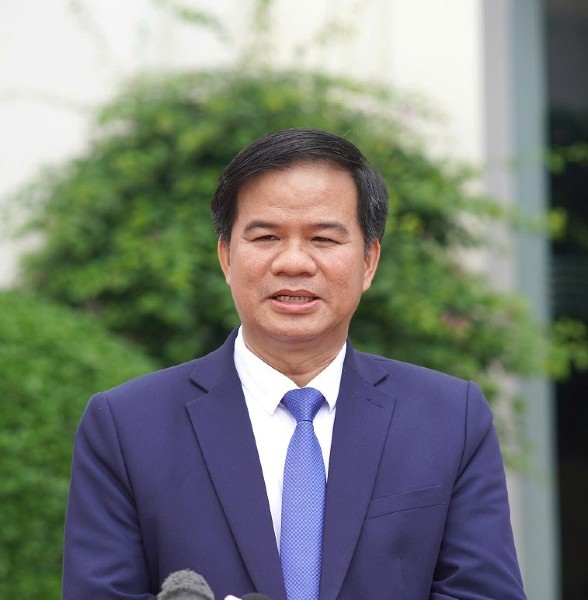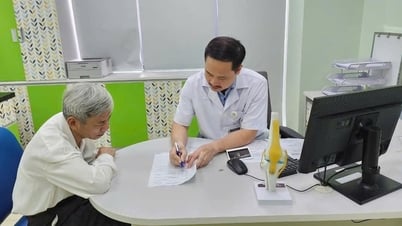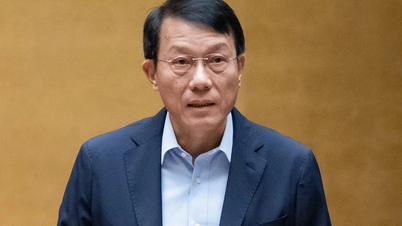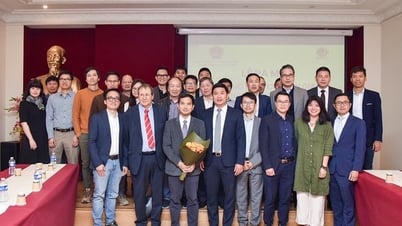The policy of free hospital treatment for all people officially initiated by General Secretary To Lam has touched the hearts of millions of people, especially those who have suffered disadvantages due to illness and circumstances.
 |
| Director of Bach Mai Hospital, Dao Xuan Co, talks with reporters. |
Associate Professor, Dr. Dao Xuan Co, Director of Bach Mai Hospital, who has nearly 30 years of medical experience, with many experiences from complex cases to touching life stories, called this a "revolutionary declaration" in the cause of public health care.
He could not hide his emotions when recalling familiar images, repeated over many years: poor patients traveling hundreds of kilometers to the final line in critical condition, families financially exhausted after each treatment.
There are families who have just escaped poverty and then fall back into poverty just because of a hospital stay for a relative. Therefore, when hearing the General Secretary clearly state his determination to exempt hospital fees for all people, the Director of Bach Mai Hospital felt like a new door had been opened, not only for the medical profession, but also for each person who is silently bearing the pain of illness.
According to the roadmap, from 2026, all people will have regular health check-ups at least once a year. In the period 2030 - 2035, free hospital treatment will be expanded to all people, after prioritizing vulnerable groups such as the poor, meritorious people, children, and the elderly. A methodical, cautious but realistic roadmap because behind it is elaborate preparation in terms of policies, resources, and social consensus.
However, according to Associate Professor Dao Xuan Co, this dream cannot come true without three important pillars: universal - comprehensive - diverse health insurance; strong state budget investment in the health system, especially in disadvantaged areas; and socialized resources from businesses, charitable organizations, and hearts that turn to the community.
The head of Bach Mai Hospital affirmed that the model of non-profit hospitals in many developed countries can be a valuable lesson for Vietnam to learn. “If we know how to mobilize and coordinate resources effectively, combined with the current economic growth rate and political determination, the goal of free hospital fees is completely feasible,” he said.
Not stopping at strategic vision, Bach Mai Hospital, where he is leading, has clearly defined its role and mission in this historic transformation process.
As a special general hospital, Bach Mai will continue to handle the most serious, rare and complicated cases; at the same time, it is a center for training high-quality medical human resources, where generations of doctors and nurses are trained in both expertise and medical ethics.
In addition, in-depth medical research is also a strategic spearhead with the expectation that Vietnam will not only keep up but also be able to contribute to world medicine with new inventions and initiatives.
However, for healthcare to truly reach every citizen, the grassroots level is where it needs the most support. Associate Professor, Dr. Dao Xuan Co believes that it is time for us to change our approach to training and using healthcare human resources for the commune and district levels.
Primary health care workers do not need to be as specialized as those at the central level, but they must be multi-talented, from midwifery, emergency care, treatment of common diseases to vaccination and basic dental care. They need to be trained closely to actual needs, recruited from the locality to be attached to and serve the community in a sustainable way.
In addition, the treatment policy and working conditions for this team also need to be fundamentally improved. They cannot do their job well without medicine, medical equipment and an insufficient income to live on.
In particular, the application of digital technology, from electronic health records to interconnected medical records, will help upper-level hospitals support lower-level hospitals more effectively, shorten treatment distances and reduce the burden on central hospitals.
Looking further, free hospitalisation is not just about helping patients reduce their financial burden. It is a new way of thinking about comprehensive healthcare, where people are placed at the centre of development. When every citizen is examined regularly, diseases are detected early and treated promptly, we will move from “treatment” to “prevention”, from passive to proactive, from coping to creating.
In the eyes of a doctor dedicated to the medical profession, Associate Professor, Dr. Dao Xuan Co could not hide his belief and affirmed that the policy of free hospital fees is a humane declaration.
This not only warms the hearts of patients but also inspires and creates responsibility for medical professionals like him, who he believes, with the consensus of the whole society, with the determination of the Party and the Government, we will be able to do it so that every Vietnamese person has the right to live a healthy life, to be protected, and no one is left behind.
Previously, on May 9, at the opening ceremony of an important event of the health sector, Deputy Minister of Health, Associate Professor, Dr. Nguyen Thi Lien Huong shared that the Ministry is being assigned the responsibility of building a breakthrough resolution on public health care. In particular, many solutions are being proposed to develop health care in a fair, sustainable and inclusive direction, with the long-term goal of free hospital fees for all people.
This is a revolutionary step in health policy, demonstrating the determination to build a humane society where all people have the right to access quality health services without worrying about costs.
If implemented effectively, this policy will contribute to improving the quality of life, reducing the burden of medical costs on people, and increasing confidence in the national health care system.
Source: https://baodautu.vn/khong-ai-bi-bo-lai-phia-sau---giac-mo-mien-vien-phi-dang-thanh-hinh-d284580.html







![[Photo] Award ceremony for works on studying and following President Ho Chi Minh](https://vphoto.vietnam.vn/thumb/1200x675/vietnam/resource/IMAGE/2025/5/20/a08ce9374fa544c292cca22d4424e6c0)






















![[Photo] Vietnamese shipbuilding with the aspiration to reach out to the ocean](https://vphoto.vietnam.vn/thumb/1200x675/vietnam/resource/IMAGE/2025/5/20/24ecf0ba837b4c2a8b73853b45e40aa7)























































![[VIDEO] - Enhancing the value of Quang Nam OCOP products through trade connections](https://vphoto.vietnam.vn/thumb/402x226/vietnam/resource/IMAGE/2025/5/17/5be5b5fff1f14914986fad159097a677)
Comment (0)